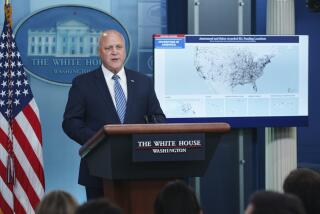Clinton Begins Push for School Computers
- Share via
WASHINGTON — President Clinton on Saturday released the first of $200 million in grants to provide schools with computers and Internet training.
“That’s how we must prepare our children for the 21st century--with the full promise of the Information Age at their fingertips,” Clinton said in announcing the first wave of Education Department grants.
In his weekly radio address, the president touted new data showing that 65% of schools were connected to the computer Internet network as of last fall, compared with 35% in 1994. “We are making a lot of progress,” he said.
But the Education Department survey of more than 900 public schools also found that just one in five teachers used advanced telecommunications, and only 13% of public schools required teacher training in the technology.
Schools with the highest concentration of poverty and those in the most rural areas are also lagging far behind in computer access, the survey found.
The new “technology literacy” grants, which are expected to fund programs in each of the 50 states by year’s end, target disadvantaged school districts.
Illinois, Mississippi and New Mexico will share the first installment of federal funds--a total of $14.3 million--to buy classroom computers, provide Internet access and train teachers to use it.
The fiscal 1998 budget plan that Clinton released last week would increase funds for the program from $200 million to $500 million, making it a $2-billion project over five years.
Clinton and Vice President Al Gore, who joined in Saturday’s broadcast, said they are making good on a campaign pledge last March to help wire every American classroom and library to the Internet by 2000.
The president also used the radio chat to plug his $51-billion education budget, which congressional Republicans immediately questioned as excessively bureaucratic.
Oklahoma Sen. Don Nickles noted in the GOP radio broadcast that there are 760 federal education programs already--32 on literacy alone. “These ideas sound good,” Nickles said. But, he added, “rather than creating new programs, shouldn’t we focus on fixing what isn’t working now?”
Clinton’s take on the issue: “During the Cold War, America had a bipartisan commitment to foreign policy and politics stopped at the water’s edge. Today, education is a critical national security issue for our future, and our politics must stop at the schoolhouse door.”
More to Read
Sign up for Essential California
The most important California stories and recommendations in your inbox every morning.
You may occasionally receive promotional content from the Los Angeles Times.










